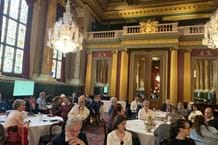The Bill has been drawn up in response to the rising tide of thefts from the railways of copper wire and other metal cabling, which has caused havoc with train timetables; from churches and other buildings of lead roofs, pipework and tiling; and, most recently, of bronze and other metals from public memorials, notably to the War dead, which has caused a particular outcry around Remembrance Day.
However, the provisions of the Bill as set out before parliament leave it open to encompass precious metals, and the sponsoring MP Graham Jones has confirmed to ATG that gold and silver would certainly be debated with a view to possible inclusion.
The soaring price for silver has certainly contributed to a rise in thefts for scrap, an issue Mr Jones says he is aware of.
"The intention is to uphold the law, that is what is important," he said.
Mr Jones has asked the House of Commons for leave to introduce the Metal Theft Prevention Bill, and wants it to include:
• a licensing scheme for scrap metal dealers;
• powers for magistrates to restrict licensing;
• a requirement that trade in scrap metal be restricted to cashless payments, so that transactions can be traced back to their origins;
• new powers for police to search properties owned by scrap metal dealerships;
• a provision that scrap metal proven to have been obtained through theft be classified as criminal assets;
• new criminal charges for theft of scrap metal, which take account of aspects of the crime perpetrated beyond the value of the scrap metal stolen, and for connected purposes.
The Local Government Association (LGA), which backs the proposals, wants even tighter controls, calling for CCTV with automatic number plate recognition in scrapyards as well as making it compulsory for scrap dealers to keep a detailed log of people who they buy metal from.
The Bill enjoyed cross-party support when it was introduced in the House of Commons and will now be drafted before returning on January 20 for further consideration. If all goes according to plan, Parliament expects it to be on the Statute Book before the end of the summer.
The inclusion of the cashless payments clause would certainly cause problems for those who wish to dispose of gold and silver honestly but discreetly, although the compulsory introduction of sales records may prove more acceptable.
In September he told the House of Commons that in 2009 there had been about 100 reported metal thefts per month according to the Energy Networks Association, which represents the electricity and gas network and utility companies. In 2011, that figure has risen to 700 thefts per month, and in one calendar month – March this year – it rose to a record 900 reported thefts.
By Ivan Macquisten




